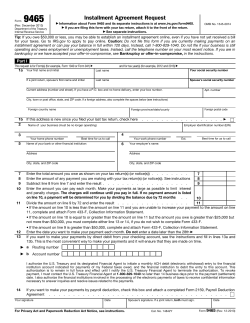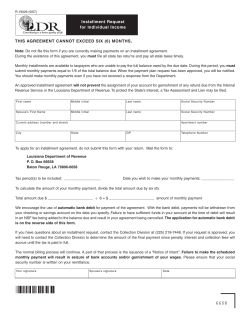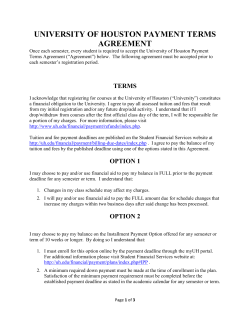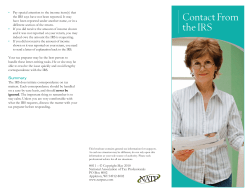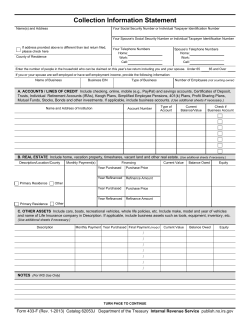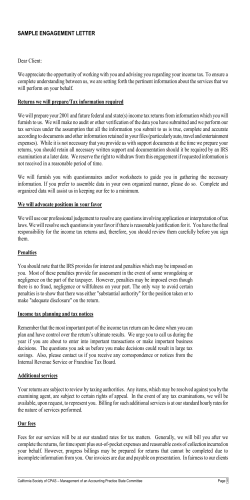
AH XSL/XML
Instructions for Form 9465 (December 2012) Department of the Treasury Internal Revenue Service Installment Agreement Request Section references are to the Internal Revenue Code unless otherwise noted. Future Developments For the latest developments related to Form 9465 and its instructions, such as legislation enacted after they were published, go to www.irs.gov/form9465. General Instructions Purpose of Form Use Form 9465 to request a monthly installment plan if you cannot pay the full amount you owe shown on your tax return (or on a notice we sent you). Most installment agreements meet our streamlined installment agreement criteria. The maximum term for a streamlined agreement is 72 months. In certain circumstances, you can have longer to pay or your agreement can be approved for an amount that is less than the amount of tax you owe. However, before requesting an installment agreement, you should consider other less costly alternatives, such as getting a bank loan or using available credit on a credit card. If you have any questions about this request, call 1-800-829-1040. Use Form 9465 if you are an individual: Who owes income tax on Form 1040, Who may be responsible for a Trust Fund Recovery Penalty, Who was self-employed and owes self-employment or unemployment taxes and is no longer operating the business, Who is personally responsible for a partnership liability and the partnership is no longer operating, or Owner who is personally responsible for taxes in the name of a limited liability company (LLC) and the LLC is no longer operating. Do not use Form 9465 if: You can pay the full amount you owe within 120 days (see Can you pay in full within 120 days?), or You want to request an online payment agreement (see Applying online for a payment agreement). Note. If you are in-business or are a business entity and owe employment or unemployment taxes, call the telephone number on your most recent notice to request an installment agreement. Guaranteed installment agreement. Your request for an installment agreement cannot be turned down if the tax you owe is not more than $10,000 and all three of the following apply. During the past 5 tax years, you (and your spouse if filing a joint return) have timely filed all income tax returns and paid any income tax due, and have not entered into an installment agreement for payment of income tax. The IRS determines that you cannot pay the tax owed in full when it is due and you give the IRS any information needed to make that determination. You agree to pay the full amount you owe within 3 years and to comply with the tax laws while the agreement is in effect. Can you pay in full within 120 days? If you can pay the full amount you owe within 120 days, call 1-800-829-1040 to establish your request to pay in full. If you can do this, you can avoid paying the fee to set up an installment agreement. Instead of calling, you can apply online. Applying online for a payment agreement. If your balance due is not more than $50,000, you can apply online for a payment agreement instead of filing Form 9465. To do that, go to IRS.gov and click on “More...” under Tools. Jan 14, 2013 Bankruptcy or offer-in-compromise. If you are in bankruptcy or we have accepted your offer-in-compromise, do not file this form. Instead, call 1-800-829-1040 to get the number of your local IRS Insolvency function for bankruptcy or Technical Support function for offer-in-compromise. How the Installment Agreement Works We will usually let you know within 30 days after we receive your request whether it is approved or denied. However, if this request is for tax due on a return you filed after March 31, it may take us longer than 30 days to reply. If we approve your request, we will send you a notice detailing the terms of your agreement and requesting a fee of $105 ($52 if you make your payments by electronic funds transfer (EFT)). However, you may qualify to pay a reduced fee of $43 if your income is below a certain level. The IRS will let you know whether you qualify for the reduced fee. If the IRS does not say you qualify for the reduced fee, you can request the reduced fee using Form 13844, Application For Reduced User Fee For Installment Agreements. You will also be charged interest and may be charged a late payment penalty on any tax not paid by its due date, even if your request to pay in installments is granted. Interest and any applicable penalties will be charged until the balance is paid in full. To limit interest and penalty charges, file your return on time and pay as much of the tax as possible with your return (or notice). All payments received will be applied to your account in the best interests of the United States. By approving your request, we agree to let you pay the tax you owe in monthly installments instead of immediately paying the amount in full. In return, you agree to make your monthly payments on time. You also agree to meet all your future tax liabilities. This means that you must have enough withholding or estimated tax payments so that your tax liability for future years is paid in full when you timely file your return. Your request for an installment agreement will be denied if all required tax returns have not been filed. Any refund you are due in a future year will be applied against the amount you owe. If your refund is applied to your balance, you are still required to make your regular monthly installment payment. Payment methods. You can make your payments by check, money order, credit card, or one of the other payment methods shown next. The fee for each payment method is also shown. Payment method Applicable fee Check, money order, or credit card $105 Electronic funds transfer $ 52 Payroll deduction installment agreement $105 For details on how to pay, see your tax return instructions, visit IRS.gov, or call 1-800-829-1040. After we receive each payment, we will send you a notice showing the remaining amount you owe, and the due date and amount of your next payment. But if you choose to have your payments automatically withdrawn from your checking account, you will not receive a notice. Your bank statement is your record of payment. We will also send you an annual statement showing the amount you owed at the beginning of the year, all payments made during the year, and the amount you owe at the end of the year. If you do not make your payments on time or do not pay any balance due on a return you file later, you will be in default on your agreement and we may take enforcement actions, such as the filing Cat. No. 58607N of a Notice of Federal Tax Lien or an IRS levy action, to collect the entire amount you owe. To ensure that your payments are made timely, you should consider making them by electronic funds transfer (EFT) (see the instructions for lines 11a and 11b, later). For taxpayers filing Form 1040 with Schedule(s) C, E, or F for any tax year for which this installment agreement is being requested. Requests to modify or terminate an installment agreement. After an installment agreement is approved, you may submit a request to modify or terminate an installment agreement. You may modify your payment amount or due date by going to IRS.gov, clicking on “Tools” and then “Online Payment Agreement.” You may also call 1-800-829-1040 to modify or terminate your agreement. TIP An installment agreement may be terminated if you provide materially incomplete or inaccurate information in response to an IRS request for a financial update. For additional information on the IRS collection process, see Pub. 594, The IRS Collection Process. A Notice of Federal Tax Lien (NFTL) may be filed to protect the government’s interests until you pay in full. However, an CAUTION NFTL is generally not filed with a Guaranteed Installment Agreement. ! Attach Form 9465 to the front of your return and send it to the address shown in your tax return booklet. If you have already filed your return or you are filing this form in response to a notice, file Form 9465 by itself with the Internal Revenue Service Center using the address in the table below that applies to you. Alabama, Florida, Georgia, Kentucky, Louisiana, Mississippi, North Carolina, South Carolina, Texas, Virginia Department of the Treasury Internal Revenue Service P.O. Box 47421 Stop 74 Doraville, GA 30362 Department of the Treasury Internal Revenue Service P.O. Box 69 Stop 811 Memphis, TN 38101–0069 Alaska, Arizona, California, Colorado, Hawaii, Idaho, Montana, Nevada, New Mexico, Oregon, Utah, Washington, Wyoming Department of the Treasury Internal Revenue Service P.O. Box 9941 Stop 5500 Ogden, UT 84409 Connecticut, Maine, Massachusetts, New Hampshire, New York, Rhode Island, Vermont Department of the Treasury Internal Revenue Service P.O. Box 480 Stop 660 Holtsville, NY 11742–0480 A foreign country, American Samoa, or Puerto Rico (or are excluding income under Internal Revenue Code section 933), or use an APO or FPO address, or file Form 2555, 2555-EZ, or 4563, or are a dual-status alien or nonpermanent resident of Guam or the U.S. Virgin Islands* For all taxpayers except those filing Form 1040 with Schedule(s) C, E, or F for any tax year for which this installment agreement is being requested. THEN use this address . . . THEN use this address . . . Alabama, Arkansas, Georgia, Illinois, Indiana, Iowa, Kansas, Kentucky, Louisiana, Michigan, Minnesota, Mississippi, Missouri, Nebraska, New Jersey, North Dakota, Ohio, Oklahoma, Pennsylvania, South Dakota, Tennessee, Texas, West Virginia, Wisconsin Delaware, District of Columbia, Florida, Maryland, North Carolina, South Carolina, Virginia Where To File IF you live in . . . IF you live in . . . Department of the Treasury Internal Revenue Service Stop 4–N31.142 Philadelphia, PA 19255–0030 Department of the Treasury Internal Revenue Service 3651 South I-H 35, 5501AUSC Austin, TX 78741 * Permanent residents of Guam or the U.S. Virgin Islands cannot use Form 9465. Specific Instructions Line 1 Alaska, Arizona, Colorado, Connecticut, Delaware, District of Columbia, Hawaii, Idaho, Illinois, Maine, Maryland, Massachusetts, Montana, Nevada, New Hampshire, New Jersey, New Mexico, North Dakota, Oregon, Rhode Island, South Dakota, Tennessee, Utah, Vermont, Washington, Wisconsin, Wyoming Department of the Treasury Internal Revenue Service 310 Lowell St. Stop 830 Andover, MA 01810 Arkansas, California, Indiana, Iowa, Kansas, Michigan, Minnesota, Missouri, Nebraska, New York, Ohio, Oklahoma, Pennsylvania, West Virginia Department of the Treasury Internal Revenue Service Stop P-4 5000 Kansas City, MO 64999–0250 A foreign country, American Samoa, or Puerto Rico (or are excluding income under Internal Revenue Code section 933), or use an APO or FPO address, or file Form 2555, 2555-EZ, or 4563, or are a dual-status alien or nonpermanent resident of Guam or the U.S. Virgin Islands* Department of the Treasury Internal Revenue Service 3651 South I-H 35, 5501AUSC Austin, TX 78741 If you are making this request for a joint tax return, show the names and social security numbers (SSNs) in the same order as they appear on your tax return. Line 2 If the address you provided on line 1 is new since you filed your last tax return, check the box on line 2. Line 7 Enter the total amount you owe as shown on your tax return(s) (or notice(s)). If the total amount you owe is greater than $25,000 but not more than $50,000, you must complete line 11 and agree to CAUTION an Electronic Funds Transfer (EFT) Agreement to qualify for an Installment Agreement (IA) without completing a financial statement. If you do not agree to a DDIA, you must complete Form 433-F, Collection Information Statement, and mail it with this form. ! * Permanent residents of Guam or the U.S. Virgin Islands cannot use Form 9465. If the amount you owe is greater than $50,000, you must complete Form 433-F and mail it with this form. You can download Form 433-F at IRS.gov or order it by calling 1-800-TAX-FORM (1-800-829-3676). If the total amount you owe is not more than $50,000 (including any amounts you owe from prior years), you do not need to file Form 9465; you can request an installment agreement online. For more information see Applying online for a payment agreement, earlier. TIP -2- Line 8 boxes blank. On the sample check below, the account number is 20202086. Do not include the check number. Even if you cannot pay the full amount you owe now, you should pay as much as possible to limit penalty and interest charges. If you are filing this form with your tax return, make the payment with your return. For details on how to pay, see your tax return instructions. Note. We may have filed a notice of federal tax lien against your property. If so, you may be able to get the notice of lien withdrawn. To learn more about lien withdrawals and to see if you qualify, visit IRS.gov and enter "lien withdrawal" in the search box. If you are filing this form by itself, such as in response to a notice, attach a check or money order payable to “United States Treasury.” Do not send cash. Be sure to include: Your name, address, SSN/EIN, and daytime phone number. The tax year and tax return (for example, “2011 Form 1040”) for which you are making this request. TIP Sample Check—Lines 11a and 11b Line 9 Paul Maple Roberta Maple 123 Pear Lane Anyplace, VA 20000 Enter on line 9 the amount you can pay each month. Make your payments as large as possible to limit interest and penalty charges. The charges will continue until you pay in full. If no payment amount is listed on line 9, a payment will be determined for you by dividing the balance due by 72 months. PAY TO THE ORDER OF ANYPLACE BANK Anyplace, VA 20000 Line 10 You can choose the day of each month your payment is due. This can be on or after the 1st of the month, but no later than the 28th of the month. For example, if your rent or mortgage payment is due on the 1st of the month, you may want to make your installment payments on the 15th. When we approve your request, we will tell you the month and day that your first payment is due. 1234 SAMPLE Routing number (line 11a) Account number (line 11b) 15-0000/0000 $ DOLLARS Do not include the check number. For |:250250025 | TIP If we have not replied by the date you chose for your first payment, you can send the first payment to the Internal Revenue Service Center at the address shown earlier that applies to you. See the instructions for line 8 above for details on what to write on your payment. :202020"'86". 1234 The routing and account numbers may be in different places on your check. Privacy Act and Paperwork Reduction Act Notice. Our legal right to ask for the information on this form is sections 6001, 6011, 6012(a), 6109, and 6159 and their regulations. We will use the information to process your request for an installment agreement. The reason we need your name and social security number is to secure proper identification. We require this information to gain access to the tax information in our files and properly respond to your request. You are not required to request an installment agreement. If you do request an installment agreement, you are required to provide the information requested on this form. Failure to provide this information may prevent processing your request; providing false information may subject you to fines or penalties. Lines 11a and 11b TIP The electronic funds transfer (EFT) from your checking account will not be approved unless you (and your spouse if filing a joint return) sign Form 9465. Making your payments by electronic funds Transfer (EFT) will help ensure that your payments are made timely and that you are not in default of this agreement. To pay by electronic funds transfer (EFT) from your checking account at a bank or other financial institution (such as a mutual fund, brokerage firm, or credit union), fill in lines 11a and 11b. Check with your financial institution to make sure that an EFT is allowed and to get the correct routing and account numbers. You are not required to provide the information requested on a form that is subject to the Paperwork Reduction Act unless the form displays a valid OMB control number. Books or records relating to a form or its instructions must be retained as long as their contents may become material in the administration of any Internal Revenue law. Generally, tax returns and return information are confidential, as required by section 6103. However, we may give this information to the Department of Justice for civil and criminal litigation, and to cities, states, the District of Columbia, and U.S. commonwealths and possessions to carry out their tax laws. We may also disclose this information to other countries under a tax treaty, to federal and state agencies to enforce federal nontax criminal laws, or to federal law enforcement and intelligence agencies to combat terrorism. If the total amount you owe is greater than $25,000 but not more than $50,000, you must agree to an Electronic Funds CAUTION Transfer (EFT) Agreement to qualify for an Installment Agreement (IA) without completing a financial statement. If you do not agree to a DDIA, you must complete Form 433-F, Collection Information Statement, and mail it with this form. ! Line 11a. The routing number must be nine digits. The first two digits of the routing number must be 01 through 12 or 21 through 32. Use a check to verify the routing number. On the sample check on this page, the routing number is 250250025. But if your check is payable through a financial institution different from the one at which you have your checking account, do not use the routing number on that check. Instead, contact your financial institution for the correct routing number. The average time and expenses required to complete and file this form will vary depending on individual circumstances. For the estimated averages, see the instructions for your income tax return. If you have suggestions for making this form simpler, we would be happy to hear from you. See the instructions for your income tax return. Line 11b. The account number can be up to 17 characters (both numbers and letters). Include hyphens but omit spaces and special symbols. Enter the number from left to right and leave any unused -3-
© Copyright 2025




